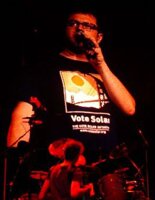|
The Future of Music: Life on the road
by Lauren Sullivan
Rock and roll has been at the forefront of the greatest social and political movements of our recent history. The 60€™s counterculture movement was catalyzed by the music industry and bolstered by artists who used their collective voice to move forward the anti-war, women€™s and civil rights movements.
Today we find ourselves at the next crossroad. This time, the issues on the table include unchecked corporate hegemony, threats to the earth€™s ecosystems, super-sizing, SUV€™s, and the love of bling. Fortunately, grassroots activism is thriving as well, as are green businesses, local farming, land conservation, environmental justice and alternative technologies. The music industry took a hiatus as a voice for change in the glam-laden 80€™s, but has proven over the past several years that it is back in full-force; sassier, more outspoken and active than ever. The future is bright for artists using their high-profile social status and voice to promote positive world change.
This year Neil Young led the environmental charge by powering his fleet of 17 vehicles entirely on biodiesel. A different approach was taken by Pearl Jam whose tour was "climate neutral." The band calculated its energy use and off-set it by purchasing and protecting a swath of rainforest in Madagascar. Bonnie Raitt, REM and Dave Matthews are some of the other well-knowns doing today€™s good work for the environment. They are protesting, speaking out and most importantly working to engage their fans and the media in an effort to create awareness around environmental issues.
 |
| BNL's Steven Page, rockin' the vote. |
This summer, Reverb provided a glimpse into the future of the rock €˜n roll tour. We had the opportunity to tour with Barenaked Ladies and Alanis Morissette to activate, inspire and educate their fan-base. Hitting over a dozen venues across the country, we pulled together key non-profits and green businesses that were advocating environmental issues near and dear to the artists. With the addition of Reverb€™s eco-village, the standard concession hot-spot was completely transformed and given a new purpose -- one that reflected the artists€™ own passions and philanthropic interests. By gathering together non-profits under one tent in the venue concourse, Reverb, BNL and Alanis exposed fans to important, future-looking causes like: cars powered by vegetable oil, anti-global warming campaigns, socially responsible investing, car-sharing, earth-friendly soy candles, and groups advocating for rainforests and indigenous communities. Additionally, one quarter of the BNL/Alanis tour was off-set by wind power donated by Community Energy.
The word is out that things need to change and musicians are once again responding with creative, savvy solutions. Artists are taking responsibility for their footprint on the natural world by recognizing the impact of the music industry, and, in particular, the business of touring. The trend is moving towards trucks and busses running on biodiesel; recycling at venues, and carbon neutral tours with philanthropic charities present. It€™s important to note that these artists aren€™t purists or holier-than-thou, but just making changes where they can; they are small steps toward making worldwide change, but every small step helps build forward momentum toward creating a cleaner, greener, better-sounding world. Reverb is grateful that they endeavor to add a €œgreen soul€ to their tour and are in turn helping to create green awareness in the daily lives of their fans.
 |
| Don't be surprised to see more eco-villages at rock shows. |
The future of the touring industry is green. Increasingly, artists are thinking more about their own impact on the environment; they€™re creating real change in their lifestyles and want to reflect that to you, their fans. When you buy a ticket to a gig you€™ll get much more than just music, a crowd, corporate beer ads -€“ you€™ll actually get the opportunity to spy the green soul of your favorite artist. Alanis Morissette said it best when she mused that many musicians are just activists in rock star clothing. So don€™t be surprised if over the course of the next few years you find yourself learning about wind turbines or having your own epiphany about converting frialator grease into fuel for your diesel car. Musicians are making great strides to help this environmental revolution, and they want you to do the same.
Lauren Sullivan is the Director and Co-Founder of Reverb.
The Future of Music: Recording and Listening
by Patrick Napper
As a working producer, composer and musician (as well as an SSF board member) I would like to share some of my perspectives on the €œfuture€ of music. This includes highlighting sustainable practices within the industry, recording artists and organizations which are making a difference, new developments in technology and my hopes for the industry€™s future. I don€™t want to speculate on the future trends in pop music styles, only to say the 80€™s are definitely back, hip-hop is omni-present and it can€™t be long until a 90€™s revival.
By now most of you have heard a great deal about digital downloading of music and €œpeer 2 peer€ file sharing and how it is affecting the record industry. Digital downloading is the future of music and the record industry saw it coming but never did anything to prepare for it; now they€™re having to scramble to get with the program. Pay sites like iTunes, are doing it right because the artist is getting paid their due royalties when you download their songs. As far as the P2P file sharing programs, like Kazaa,, I have mixed emotions. When I was in high school, my best friend and I were huge record collectors. Whatever record he didn€™t buy, I did, and vice versa. We would record our LP€™s onto cassette tapes (remember those?) for each other. Now if you rip a CD onto your hard drive and share it out on a program like Kazaa, you are basically giving a copy away to thousands of strangers. This isn€™t right, and if we don€™t draw the line somewhere, the music fans will ultimately suffer. The Recording Industry Association of America (RIAA) is constantly filing lawsuits against the biggest offenders of anonymous file sharing, and they are serious: according to their website, €œThe online infringement of copyrighted music can be punished by up to 3 years in prison and $250,000 in fines. Repeat offenders can be imprisoned up to 6 years. Individuals also may be held civilly liable, regardless of whether the activity is for profit, for actual damages or lost profits, or for statutory damages up to $150,000 per infringed copyright.€. For my two cents, I like to enjoy the music I love with a good conscience, knowing that the artist is being compensated for it. This helps to ensure that the artist is sustained and will be around to produce more music.
This leads into the subject of technology. Everyone seems to have the iPod right now. A gadget as small as your cell phone that can hold up to something like 11 straight days worth of music without repeating a song. Pretty amazing, I admit, although I have not personally taken the plunge yet. I am still attached to the artwork and packaging of LP€™s and CD€™s and the concept of an €œalbum€. I hope this concept does not die and that artists and labels come up with a way to encourage fans to purchase or download an album as a whole work of art either through price breaks or additional features and to include artwork in the digital domain. Kudos to Maverick Records and Keaton Simons for releasing his debut CD using packaging made of recycled materials. This is a practice I hope to see more and more labels adopt.
It will be interesting to watch as commercial free satellite radio, Sirius and XM, take on terrestrial radio head to head. Will more and more people subscribe to satellite radio as Sirius picks up €œshock jock€ Howard Stern€™s program and XM picks up Major League baseball? Neither of these examples really represent the traditional music scene, but they will ultimately have an effect on artists who want to get airplay; there are only so many frequencies -- satellite or otherwise -- to listen to, and only so many hours in a day we have to listen. Satellite radio is providing a wide variety of content and opportunities for unsigned artists that will be difficult for terrestrial radio to compete with because they are catering to their advertisers and the record labels. The future of radio is at stake.
Finally, I want to recognize some artists and organizations for their contributions this past year and I hope their example will be followed by many in the future.
- Dave Matthews and Willie Nelson, for reviving Farm-Aid and bringing it to the Pacific Northwest for the first time ever.
- VH1, for continuing to support music in the public schools with their €œSave The Music€ campaign.
- Keaton Simons, for performing at the inaugural OSSA awards, put on by the Sustainable Style Foundation.
- The Recording Academy, for their €œWhat€™s The Download?€ campaign, educating youth about the ethical issues surrounding digital music downloading and P2P file sharing.
- Everyone who is paying for those downloads.
Happy Holidays!
Patrick Napper is a musician and producer, as well as a member of the Board of Directors for the Sustainable Style Foundation. Check out his website to learn more about his life and music. He lives and works in Seattle, Wash.
|




